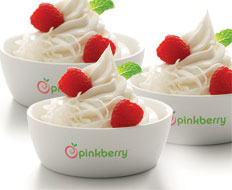Ron Graves, CEO of Pinkberry, says the six-year-old frozen yogurt chain could be growing faster than it already is, but that the bar is set high for potential partners.
“We have thousands of inquiries from people who want to be franchisees, but we have a very distinct screening process we go through,” he says. “Our growth strategy is one quality store at a time, one market at a time, one quality partner at a time.”
Pinkberry does not sell single franchises, which narrows the field because franchisees must have enough capital to develop a multistore footprint. In addition, Graves says, they must have relevant experience, local area knowledge, and “like-minded values.”
“Pinkberry has a distinct culture and values,” he says. “We look at how people value both the customer and employee experience, and how they view the Pinkberry brand. It’s about team member excellence, not selling yogurt. It’s about people connecting.”
The first two people to make a huge impact on the Pinkberry brand were co-founders Shelly Hwang, a restaurateur, and Young Lee, a designer with a sweet tooth. In 2005 they combined a proprietary recipe for a frozen dessert product with an innovative store design and social experience to create instant buzz in West Hollywood. Pinkberry quickly gained a cult following in Los Angeles, and after a couple of years the brand spread to New York.
The founders grew the chain to 34 stores in California and New York when, in October 2007, the company got an infusion of $27.5 million from Maveron, the venture capital firm launched by Starbucks chairman Howard Schultz. Graves, who had been a partner with Maveron, became CEO of Pinkberry.
Since then, Pinkberry has expanded into additional U.S. markets including Georgia, Massachusetts, Florida, Texas, Tennessee, Virginia, Louisiana, Connecticut, North Carolina, Colorado, Hawaii, and the District of Columbia, as well as internationally in Mexico, Kuwait, Bahrain, Qatar, and Dubai. A Pinkberry also recently opened in Lima, Peru, Graves says.
An average Pinkberry store is 1,000 square feet, but the footprint is flexible and can be adapted to airports, malls, and
college campuses.
“There are some really amazing, beautiful Pinkberry locations,” Graves says. “The environment is bright, energetic, and clean with attention to detail and quality from design to music and lighting. We’ve taken creative steps in store design because one of our core values, in addition to service and product, is inspirational environment.”
But the product is critical to the company’s success. Graves says people claim to crave what the company calls the “Swirly Goodness” of Pinkberry frozen yogurt, which is made with real dairy products and contains live and active cultures.
“We have a distinct product,” Graves says. “It is a proprietary formulation with a taste described as light and refreshing with a clean finish … not that filmy dairy aftertaste some products have.”
Served in a cup or cone, Pinkberry frozen yogurt is sweet but has a signature tang. Flavors include Pomegranate, Chocolate, Mango, Coconut, and Green Tea. Most are nonfat, except for a few flavors, like Coconut, that have a minimal amount of naturally occurring fat. Most stores offer six flavor choices each day, including a seasonal flavor or two. Recent seasonal flavors have included Watermelon and Blood Orange.
Pinkberry
CEO: Ron Graves
HQ: Los Angeles
Year Started: 2005
Annual Sales: Undisclosed
Total Units: 110
Franchise Units: 92
Choices at Pinkberry don’t end with the yogurt flavors, however. Assorted fresh fruits, including kiwi, mango, berries, and bananas, are cut fresh in store daily to top the fro yo. In addition, customers can choose from a wide assortment of both dry and liquid toppings, including nuts, animal crackers, brownie bites, organic gummy bears, fruity pebbles, honey, and Italian caramel.
Pinkberry also serves a Fresh Fruit Parfait in addition to Original and Green Tea smoothies. The frozen yogurt can be purchased in take-home containers and is available for delivery in some markets.
“All the New York stores—and many others across the country—do delivery,” Graves says. “We wanted to be able to bring Pinkberry to our customers.”
Pinkberry caters in many locations, bringing frozen yogurt and fresh fruit to weddings, parties, and business functions.
While frozen desserts are traditionally an afternoon or evening snack, Pinkberry parfaits made with fresh fruit and granola have made mornings busier for the stores.
“I’ve seen people ordering parfaits for breakfast at 6 a.m. when our store in [Los Angeles International Airport] opens,” Graves says.
And for customers who might not be up for something frozen for breakfast, Pinkberry has developed Swirly Whip, which can be substituted for the frozen yogurt in a parfait or fruit bowl any time of the day.
“It’s our own version of whipped cream,” Graves says. “It has the same flavor profile as the frozen yogurt.”
Graves says Pinkberry customers are passionate about the brand, and word of mouth—especially through social media—has been effective advertising for the company, as evidenced by its making the Top 25 Most Social Restaurants list from social media management company Vitrue since 2009.
“Pinkberry is a very social brand,” Graves says. “There is a lot of dialogue going on about it.”








